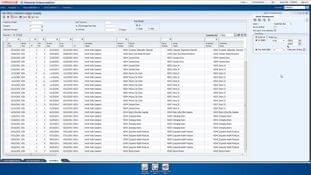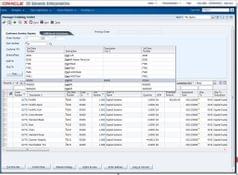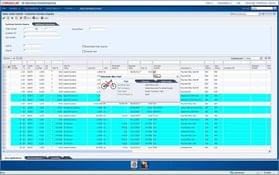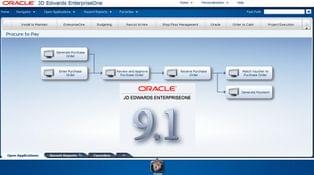JD Edwards EnterpriseOne
4 Reviews 1.5/5 ★ ★ ★ ★ ★A complete ERP system designed for large enterprises that manufacture, distribute, construct, or manage products and services.
Product Overview
JD Edwards EnterpriseOne is an ERP with a fully integrated suite of over 80 business applications. The platform can be deployed on Oracle’s cloud, a private cloud, on-premise, or a hybrid cloud model to fit each business’s needs. It is ideally suited for organizations that manufacture, construct, distribute, service, or manage products and physical assets.
With JD Edwards EnterpriseOne Release 25, Oracle has updated several of its core modules, including procurement, manufacturing, and finances. It also augmented the platform with Oracle Cloud infrastructure services, including AI. Read more about the update in their Release 25 announcement.
Pros
- Highly scalable and flexible
- Updates are often released quarterly
- Over 80 enterprise level applications
- Renewed support through at least 2033
Cons
- Steep learning curve
- High total cost of ownership
- Complex Implementation process
Target Market
Typically enterprise-level and some medium-sized organizations. JD Edwards EnterpriseOne is utilized by clients across the manufacturing, construction, agriculture, and distribution industries. The average revenue for JD Edwards EnterpriseOne clients is around $50M and up to more than $1000M.Not Recommended For
Small to medium organizations and businesses with little to no IT structure may struggle to utilize this system to its full potential. Organizations that are not ready to invest time and resources to train employees on the platform.Video Overview
Key Features
Financial Management
Includes modules for accounts receivables, accounts payables, general ledger, lease management, joint venture management, cost accounting, expense management, and fixed asset accounting. Together, these modules automate financial operations and cash flow management, enhance cost control, and help enterprises maintain accurate financial records.
Manufacturing
Offers capabilities to manage all types of manufacturing, especially mixed-mode manufacturing (process, discrete, and repetitive manufacturing). It includes requirements and resource planning, complex product configuration, and even a quality management module. Manufacturers can reduce inventory overhead, integrate multiple manufacturing facilities, and improve purchase and manufacturing processes.
Supply Management
JD Edwards EnterpriseOne enhances supplier relationships for direct and indirect goods or services. It includes real-time supplier communication with automated and proactive alerts for low supplies or materials. It supports leading procurement best practices and lean processes, helps aggregate spending for more purchasing power, and improves supplier relationships.
Project Management
The platform includes features specific to industries that require project management. It includes project costing, job forecasting, contract and service billing, change management, and even a specific package for homebuilder management. Users can track committed, actual, and final amounts for a project and manage the approval process change orders in real time. Homebuilders can manage vendors and subcontractors and can track profitability by lots, community, or project.
Human Capital Management
The HCM product includes modules for human resources, payroll, time/labor management, and self-service HR. It supports workforce planning, benefits administration, and employee development tools, which improve overall HR efficiency and compliance with local and global standards.
Customer Relationship Management
The CRM module includes sales force automation, customer service management, marketing automation, and order management. The service management module has call center management and a customer self-service portal for product registration, service requests, and product status inquiries. The CRM includes multi-channel marketing, multi-language support, and rules-based alerts and notifications.
AgriBusiness
JDE EnterpriseOne has specific modules for industries working with agriculture, including food and beverage manufacturers, growers, food processors, and distributors. For growers, it specifically helps with pricing products, tracking harvest records, and keeping track of all the products. It allows wine and beverage manufacturers to keep track of their blending and manufacturing processes with blend management. For food suppliers and distributors, it can assist with order management, weight tracking, and pricing structures.
Product Overview
Developer Overview
Related Products
User Reviews of JD Edwards EnterpriseOne
Write a ReviewAbsolute Barking Dog of a program
Absolute Barking Dog of a program. In theory you can monitor down time and mean time between failures but this requires an army of highly skilled clerical people entering data into many different parts of the program with high levels of access. An incredibly expensive program to buy and a complex and expensive program to use and maintain. You are unlikely to see a positive return on investment from JDE.
Pros
You can export the contents of almost any screen to Excel or CSV to work with it outside JDE. Screens are vey configurable to show the information you need to see for the function you are performing.
Cons
Basic functionality for maintenance planning is available at additional cost or not available at all. Predicted dates for maintenance tasks are not dynamic and poorly calculated so not suitable for mobile plant. Plant can be overdue service but the planned date in JDE will still be some weeks away. You will need to export all your data to Excel or use another application to effectively plan your maintenance. There are a lot of better systems out there but none that are worse from a users point of view.
One of the worst systems I have ever used
JD Edwards production E1 system has to be one of the worst systems I have ever used in my life. There is basically no way of teaching yourself how to use this system without a system without excessive manuals and even at that you’ll never know the full extent of the system.
Pros
Nothing
Cons
Everything
- Health Care Providers & Services
- 1-10 employees
- Annual revenue $0-$1M
the reporting sucks and the information is horrible
We use an old JD Edwards EnterpriseOne ERP which has requires us to do a lot of hardcoding of commands. We looked at a demo of the new version and although the point and click features are nice, the reporting sucks and the information is horrible. Needing to upgrade for $1.2 million did not seem worth it. I believe there are more cost effective and better functioning programs out there.
- Renewable Electricity
- 51-250 employees
- Annual revenue $10M-$50M
JD Edwards EnterpriseOne Review
Using HR, payroll, and GL - It’s not easy to use for our users, it’s old and antiquated, it’s not web based. We have problems using it from home or off site









